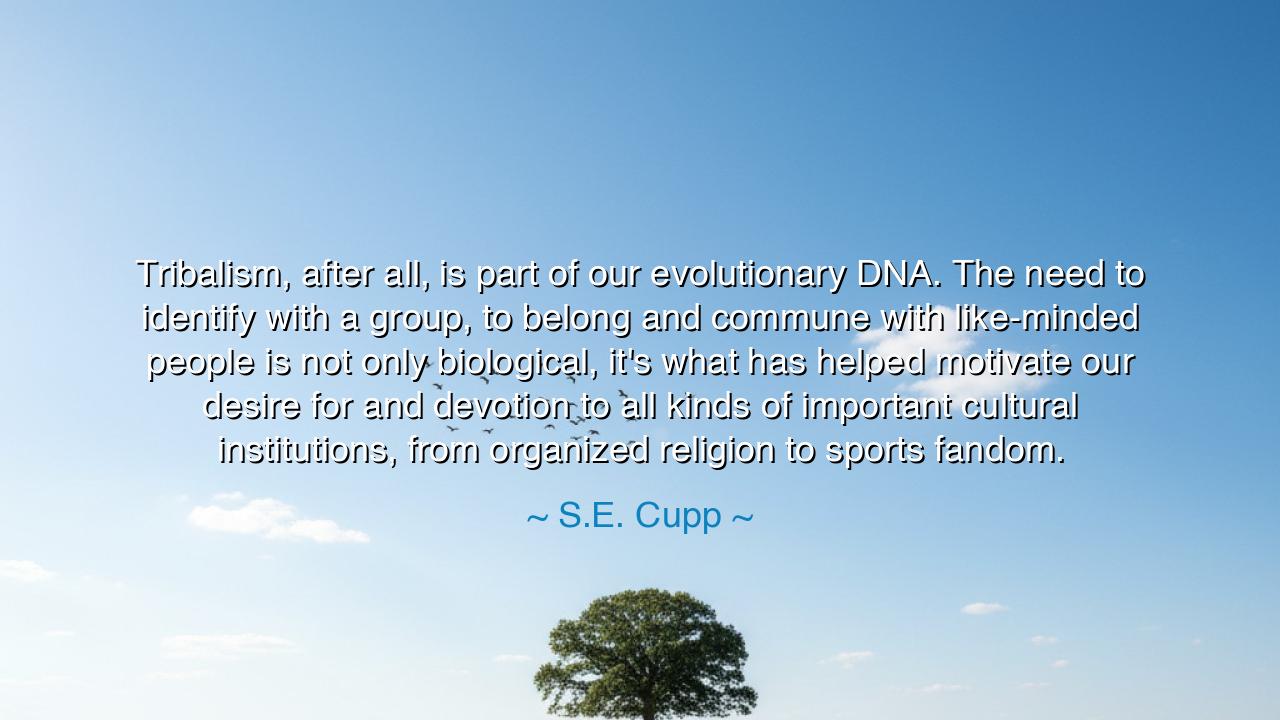
Tribalism, after all, is part of our evolutionary DNA. The need
Tribalism, after all, is part of our evolutionary DNA. The need to identify with a group, to belong and commune with like-minded people is not only biological, it's what has helped motivate our desire for and devotion to all kinds of important cultural institutions, from organized religion to sports fandom.






In the deep recesses of human history, there exists a primal urge—tribalism—that has shaped the way we live, the way we organize, and the way we understand our place in the world. S.E. Cupp aptly captures this truth when she says, "Tribalism, after all, is part of our evolutionary DNA. The need to identify with a group, to belong and commune with like-minded people is not only biological, it's what has helped motivate our desire for and devotion to all kinds of important cultural institutions, from organized religion to sports fandom." At its core, this quote speaks to a fundamental aspect of our human nature: the longing to belong, to find connection with others who share our values, beliefs, or passions. This tribal instinct is not merely a social construct but is woven into the very fabric of our evolution.
From the earliest tribes of hunter-gatherers, humans have always sought to form close-knit communities. The survival of our ancient ancestors depended on their ability to work together, to cooperate in hunting, gathering, and defending against threats. Tribalism was not just a social luxury—it was a matter of life and death. The strength of the tribe, its ability to stand united, was the bedrock upon which human society was built. The bond shared by tribe members was forged through mutual need, protection, and the collective pursuit of survival. As Herodotus, the ancient historian, observed, the greatness of empires and societies often rested not in the might of a single leader but in the unity of the people. Without this unity, the empire, no matter how great, would crumble.
In the sacred texts of many ancient cultures, we see this tribal bond reflected in the gods and mythologies that form the bedrock of religious beliefs. The Greek and Roman pantheon, with its powerful gods and divine heroes, was a reflection of the social order—gods who ruled over specific territories, bestowed blessings, and demanded loyalty from their followers. In Judaism, the tribe of Israel was not only a community of people but a people bound by a covenant with the divine. The faith was as much about group identity as it was about individual salvation. In both cases, the devotion to religion or the divine was deeply intertwined with tribal identity. This connection between tribalism and religion continues to echo through the ages.
Consider, too, the example of the Roman legions. The Romans, who created one of the greatest empires the world has ever known, did so through the incredible strength of their military tribes. Roman soldiers were bound not only by duty and honor but by a deep sense of belonging to their unit, their brothers-in-arms. It was this tribal loyalty that allowed the Romans to conquer vast lands, to build roads that stretched across continents, and to create an empire that lasted for centuries. The tribal instinct to belong to something larger than oneself was the very heart of Roman power, whether in battle, governance, or culture.
In the modern world, tribalism has manifested in new forms. While the ancient tribes fought for survival, today we find ourselves connected to groups through sports, politics, and cultural institutions. Think of the fervor and passion with which fans identify with their favorite sports teams. Much like the tribes of old, sports fans are bound by a shared identity, a sense of loyalty, and an unwavering belief in the superiority of their team. Whether it’s the New York Yankees, Manchester United, or the Brazilian national soccer team, these modern tribes are driven by the same instincts that guided our ancestors. Cupp’s insight into the link between tribalism and sports fandom is not just about mere entertainment—it is about identity, belonging, and the primal need to be part of something larger than oneself.
The lesson here, however, is not merely about understanding the biological basis of tribalism, but also about recognizing its power and influence in our modern lives. Tribalism, in its positive forms, can foster community, belonging, and a sense of purpose. It can unite people, provide strength, and even inspire greatness. But we must also be mindful of its dangers. When taken to extremes, tribalism can foster division, intolerance, and conflict. Throughout history, we have witnessed how the need to belong can be manipulated, leading to violence and warfare between tribes, nations, and ideologies. From the ancient Greeks to the world wars of the 20th century, the darker side of tribalism has often led to suffering and destruction.
In our lives today, we must find a balance. We should embrace the positive aspects of tribalism—the sense of belonging and shared purpose—but be cautious not to let it blind us to the value of diversity and understanding. As Cupp suggests, tribalism is deeply embedded in our evolutionary makeup, but it is also within our power to transcend the divisions it can create. By recognizing that tribal loyalty can exist alongside respect for the individual and the collective, we can create communities that are both unified and inclusive. Let us celebrate the positive aspects of our tribal instincts, while striving to build a world that is greater than any one group—a world where the bonds that connect us are stronger than the forces that seek to divide us. In unity, we find our greatest strength. In diversity, we find our highest potential.






AAdministratorAdministrator
Welcome, honored guests. Please leave a comment, we will respond soon